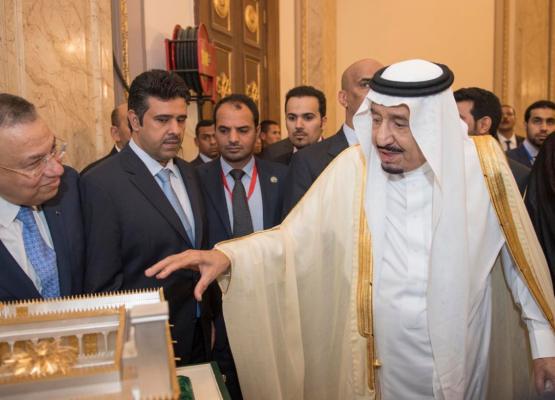Egypt has undergone many changes; it used to be a monarchy in the eras of Kings Fouad and Farouk, turned into a revolutionary republic, then a communist one, was later ruled by Sadat, Mubarak and then the Muslim Brotherhood leader Mohamed Morsi. Despite the changes in Egyptian leaders and their political tendencies, Saudi Arabia and the Gulf countries have always considered Egypt to be an essential pillar in their strategic calculations.
When the relationship was strained for about five years in the sixties, the entire region was disrupted. Relations were restored immediately after the 1967 war and they resumed their historic track. The stability of the region depends on Saudi Arabia and Egypt.
This explains the tremendous commotion caused by the Egyptian opposition, particularly overseas, and forces allied to them, before and during King Salman bin Abdulaziz’s visit to Egypt. The opposition wanted to embarrass President Abdel Fattah El-Sisi and the Egyptian government because they already knew that they could not prevent the visit which later turned out to be the most important visit of its kind since King Faisal visited Gamal Abdel Nasser. King Faisal’s visit repaired and cemented the relationship in 1969- the same relationship that we see today.
The opposition has exaggerated narratives about Saudi – Egyptian regional differences and employed these differences to create doubt about the success of the visit. However, the agreements that were signed between the two countries and their distinctive nature came as a surprise. They were greater than anything that we had expected and are unprecedented.
It came as a surprise even to those who know about the intimate relationship between the king and the president. Most of the agreements are strategic projects and the most prominent of them is the announcement to construct a bridge linking the two countries, and therefore the two continents of Asia and Africa. The King Salman Bridge is just as important as the Fatih Sultan Mehmet Bridge which is also known as the Second Bosphorus Bridge that spans the Bosphorus strait and links Asia and Europe. After it has been built, the King Salman Bridge will be the first geographical passageway between the two countries.
The agreements included a power connection, the return of the islands Tiran and Al-Sanafir to Saudi Arabia and fifteen other important agreements that will deepen the relationship between the two shores of the Red Sea.
The Egyptian opposition, who are opponents of the Gulf, Saudi Arabia in particular, has a short-sighted vision aimed at sabotaging the relationship to serve their immediate interests. However, for Cairo and Riyadh, the relationship between the two countries since 1936 has always been a strategic matter.
They will not allow the balance of the relationship to be disrupted because of differences related to subsidiary bilateral positions, views on regional events or press articles. Seasoned politicians differentiate between strategic matters and subsidiary matters, between higher goals and tactical initiatives, between differences and disputes and allow some room for movement, diversity, and even difference.
Ironically, most of the complaints made by both sides focussed on the poor implementation of the agreed upon cooperation. This means that both sides have strong aspirations for greater cooperation but that the mechanism of action often encounters obstacles that are not political at all.
Gulf countries want to increase investment and economic activity in Egypt and Egyptians are demanding the same thing. Old bureaucracy causes joint action, whether at the level of government or in the private sector, to fail and is their number one enemy.
Very big ambitions exist, but unfortunately they have been dwarfed by systems that do not keep pace with the new world and those guardians of bureaucracy who miss opportunities for possible developmental transitions.
If Gulf states, with their large financial investments and international trade partnerships, work with Egyptian partners and the largest market in the region, Egypt’s developmental problems can be transformed into advantages. For example, overpopulation can be turned into power for Egypt and the region. The issues of financial surplus and overpopulation require brave political decisions to overcome the slow pace.
Egyptians, citizens of Gulf countries and all Arabs want to end this crisis of chronic failure, and the ambitious agreements signed by King Salman and President El-Sisi express the hopes of the peoples of the region for a better future. The peoples of the region want governments to devote themselves to building, development and meeting needs instead of political positions and repetitive announcements. These promised projects represent the largest programme of action between two countries in the region and this is why the news was well received by all, except the opposition.
Opposition activists want to thwart any cooperation in order to demonstrate the government’s failure and to corner it. On the other hand, most of the issues discussed during the Saudi monarch’s visit to Egypt are developmental issues that concern the present and the future of 100 million Egyptian and Saudi citizens, their lives and the future of their children which they want to distance from political tampering.
Egypt is a state with large potential. It deserves the attention of everyone because a stronger Egypt means a stronger region. The US government is encouraged by the opening up of Iran and considers it a promising country, when in fact it is a very backward regime compared to Egypt.
In response to the international project for Iran to succeed, we should place our bets on Egypt. This is what the Saudis, Emiratis and others who believe in developmental projects and not just military ones are doing.
